
views
There can always be debates and opinions about how long the delay was before China informed the world about the Coronavirus disaster that was headed it’s way, but largely, it has been more than two months since the Coronavirus, or COVID-19 has had people landing up in hospital. The initial symptoms are very flu-like—cough, cold, scratchy throat, running nose and even a fever. But it progressively becomes worse, with breathing difficulties, pneumonia and even coughing up blood adding themselves to the symptoms list. At the time of writing this, the official figures (and these could be on the lower side, mind you, as authorities around the world scramble to confirm and reconfirm cases), there are more than 95,000 infected around the world. South Korea just reported a massive spike in cases, with takes the cases in the country to 5,766. China remains the worst hit—80,410 in Mainland China, 105 in Hong Kong and 10 in Macau. Italy, Iran, Japan, France, Germany, Spain, US, Singapore, Switzerland and the UK have also been reporting some of the worst numbers. India has confirmed 29 cases as of now. That leads us to the big question—where is the vaccine and what is the treatment right now?
Answering the second question first—the treatment. There is absolutely no treatment for the Coronavirus. At best, you pray that your body’s immune system is able to fight the virus. Doctors will give you medication for the other symptoms, such as fever, cough etc., but there is nothing that targets the virus directly. “There is no specific antiviral treatment recommended for COVID-19. People with COVID-19 should receive supportive care to help relieve symptoms. For severe cases, treatment should include care to support vital organ functions,” says the US Centers for Disease Control and Prevention (CDC). “There is currently no specific treatment for coronavirus. Antibiotics do not help, as they do not work against viruses. Treatment aims to relieve the symptoms while your body fights the illness,” clarifies the UK’s NHS.
Most important is—you need to stay in isolation and away from other people until you've recovered.
Now, the vaccine. In simple terms and not getting into complex medical explanations that your truly is not equipped for, a vaccine introduces the body’s immune system to a particular virus or a pathogen and helps the body create a memory of that—after a tryst with a weakened form of the same virus that it wants to protect the body against. Post vaccination, the immunization stage happens in which the body’s immune system learns how to fight it. In the event a person is exposed to the same pathogen at some point down the line, the body will be able to counter it. There. Simple enough.
But what about the Coronavirus? I know you are getting impatient.
At this time, there is absolutely no vaccine for the Coronavirus, or COVID-19. There is no way to prepare the human body for fighting the Coronavirus infection. The body, in case someone is infected, has to learn on the fly (for the lack of a better illustration) to fight the virus. Those will stronger immune systems are able to fight it, while some may not. It is also important to get the symptoms of the Coronavirus infection treated immediately, so that the body has better bandwidth (again, the lack of a simpler term) to fight the virus instead.
So, when will the COVID-19 vaccine be ready?
Not anytime soon, irrespective of the different reports that you may be seeing across the free expanse of the world wide web. If we are to believe the National Institute of Allergy and Infectious Diseases director Anthony Fauci, the vaccine is still at least a year and a half away. “It will take at least a year and a half to have a vaccine we can use,” he told the US senators earlier this week. There are reasons why it takes as long as it does, even though scientists and pharma companies are working at full steam to get the vaccines ready.
The first stage is to get the vaccine candidate ready. Once that is done, the process reaches the stage which takes the maximum time—the clinical trials. The first phase is when healthy volunteers are used to test if the doses of vaccine are safe and whether there are any side effects, if any. This process, scientists say, takes three months. Phase 2 happens if the first stage passes by without any ill-effects being noticed on the volunteers—and this time, the injections will happen on a much larger spread, preferably in an area that has COVID-19 patients, to see how the vaccine works on those who are in close proximity of the infected. The data from this is collected for about 6 months. If this goes well without any failures, then comes phase 3. The net will be much wider than before, again in an area that is actively infected. The data collection takes another 6 months. Once all this is done, the vaccine sample and the collected data is shared with the regulators, such as the US Food and Drug Administration (FDA) for review and approvals for clinical use. Even if the FDA is to drop everything it is doing and approve the Coronavirus vaccine as quickly as it can, it will still take some time to verify the data and the approve the vaccine. Keep some headroom for extensive testing, and all things go smoothly through the process, we are still looking at close to 15-18 months before the Coronavirus vaccine is available for everyone. That is, the summer of 2021.
It is unlikely that despite the obvious urgent demand, pharma companies will rush a vaccine into the market. If it is not up to the mark or isn’t tested properly, that could mean a rather high risk situation for the patients and the companies. Four pharmaceutical companies are the go-to names in the vaccine business—the GlaxoSmithKline, Pfizer, Merck and Sanofi. But at this time, there are a lot more candidates showing interest. These include American companies Moderna, CureVac, Inovio, Takis BioTech, India based Zydus Cadilla, Johnson & Johnson, the Imperial College of London, University of Oxford and the University of Queensland. The Financial Times reports that the Coalition for Epidemic Preparedness Innovations, a three year old partnership of governments, industry and charities to fight emerging diseases that threaten global health, is already sponsoring four COVID-19 vaccine projects, including Moderna’s.
At the same time, one also has to factor in the uncertainties. For instance, SARS vaccine was under tests when that outbreak disappeared all of a sudden (fantastic news, whichever way you look at it), but that meant pharma companies had to abandon those tests. A lot has to do with the duration of the outbreak.
Till the vaccine comes, all we can do to fight the possibility of a Coronavirus infection is to maintain good hygiene. Wash your hands regularly with soap, use hand sanitizers and avoid touching your face. “Clean your hands with an alcohol-based hand rub or wash them with soap and water. Avoid touching your eyes, mouth, or nose,” says the NSW Ministry of Health, Australia. Avoid contact with anyone who may be infected or is showing possible signs of infection. Keep your surroundings clean. And hope for the best.




















Comments
0 comment